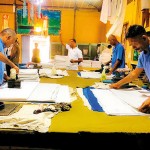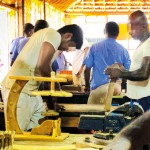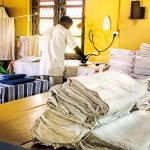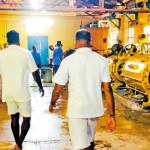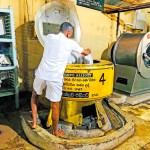News
Prison laundry: The untold story
View(s):The laundry washing machines used in the British era between1943-1948 are still in use and functioning well at the Welikada prison.
These machines imported during the British rule are functioning better than the modern ones as they are handled by prisoners and officers with their expertise.
No one is called for any repairs because the prisoners themselves are able to attend to them.
Eighty bed sheets could be washed at a time by these old washing machines made of thick steel and which are 10-fold stronger than the new ones.
The brand name of the washing machine made in 1943 is Manlove, Alliott & Co. Ltd. The machines now
run on electricity is said to have been run earlier by steam. One of the
chores when rigorous imprisonment was given to prisoners was to do the washing with steam.
The washing done by these machines are ironed by prisoners using charcoal irons. The heat of the iron heated by charcoal is never to be found in the present day house in modern society.
According to Prison Rehabilitation Commissioner Jagath Weerasinghe, the first six months of a prisoner’s sentence is spent without any mental ‘inconvenience’. That period allows them to reflect on their misdeeds and repent.
He said “when engaging them in industries as in the past under the British rule, a method of grading is done. In the first 6 months a prisoner is given Grade 1 and paid one rupee a day. In the next 6 months they are given Grade 2 and paid 1.50 rupees. The next 6 months is Grade 3 and they are paid 2 rupees. Then Grade 4 and 2.50 is paid for the remainder of time spent in prison.
During the British rule Rs 2.50 was sufficient to make a living. Now a salary is paid in addition to Rs 2.50. The salary depends on what is agreed upon with a businessman. Salaries should be increased as prisoners’ dependents survive on it. Therefore, a new method should be implemented.
According to Prisons Commissioner General Thushara Upuldeniya, prisoners’ lives are to be improved so that they are not a burden to the country; while in prison they could earn some money for their families.
“Many are talented and these are to be considered. They need the help of businessmen. They need help to become useful. By engaging them in the relevant vocational training according to their talents, an NVQ certificate is given to enable them to get a job here or abroad, once they complete their sentence,” he said.
Pix and text by Rekha Tharangani Fonseka
The best way to say that you found the home of your dreams is by finding it on Hitad.lk. We have listings for apartments for sale or rent in Sri Lanka, no matter what locale you're looking for! Whether you live in Colombo, Galle, Kandy, Matara, Jaffna and more - we've got them all!


